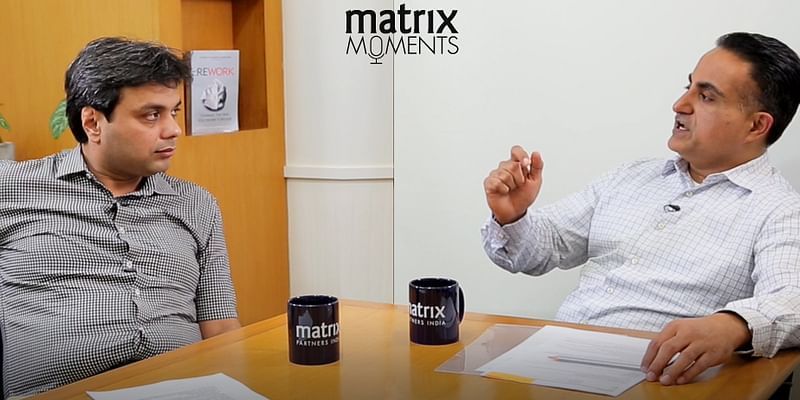In an attempt to truly decode the VC-founder relationship, this Matrix Moments episode features Asish Mohapatra, Co-Founder of OfBusiness – one of India’s leading tech-driven B2B lending platform, which is also a Matrix portfolio company – in conversation with Avnish Bajaj, Founder and Managing Director, Matrix Partners, India.
Before setting up OfBusiness, Asish worked with Avnish closely as part of Matrix’s investment team.
This episode follows a role-reversal of sorts, where Asish, in his capacity as a founder, interviews Avnish on topics such as fundraising, early-stage, and VC investing. The conversation covers questions that first-time founders always think about, but have never asked a VC.
“The most interesting thing about this relationship is that Asish used to be at Matrix Partners, India. He was a venture capitalist before better sense prevailed. And, actually, better sense has prevailed for him multiple times,” says Avnish, at the top of the hour.

Asish and Avnish
“This episode is a little bit scary because it is Asish asking me, as a founder, questions about venture capitalism. And for those of you who know Asish well, that’s probably a bigger risk that I am taking than investing in Asish’s company,” he jokes.
The witty repartee leads into Asish posing some interesting questions to the seasoned investor: how does a VC decide the founder is ready for investments; what if the founder believes in his or her product, and puts all their eggs in one basket; and what are some signs of a company being VC-ready.
Being VC-ready
Often when somebody is not VC-ready, it has more to do with if the venture is one that can be backed by VC, or more so are they even VC-backable. Citing an example, Avnish says,
“I don’t want to be derogatory, but even a kirana store makes money. It’s a profitable business. But it is a lifestyle business. So, I find that if the intrinsics are lined up, the reason we may say that this business is not VC-ready is because we feel it’s not a fundable venture, and doesn’t have the hockey-stick nonlinearity,” says Avnish.
While every founder wants to have a conversation with an investor to understand if they can be invested in or not, Avnish adds the best way to get introduced to a VC is through a reference.
Speaking about an investment Matrix is currently evaluating, Avnish says the team brainstormed for at least six months before making any decisions.
“For me as a VC, during that brainstorming, my conviction kept going up even though the ideas kept changing and getting dismissed. So, I think it’s important to set it up correctly,” says Avnish.
On picking the kinds of founders to invest in, Avnish says,
“I think where we have invested in great founders, where it hasn’t worked, is that the choice of the market has turned out to be more limited than we expected. It’s not that it will never be ready. The founders are working very hard, but you are burning through money. I think some will turn around. But there are the ones that don’t turn around, or the ones that go, let’s say, not so well.”
Earlier, 80 percent of Matrix’s deal flow would be young 20s cohorts; today 70 percent to 80 percent of the deal flow is from experienced founders. But there always are learnings even for the investor, the veteran VC adds.
Team better than one
Is private equity or the investing business just about the founder? Obviously, a great founding team is better than a single founder, and they attract higher valuations when compared with single founder-led companies.
But it is more about how the team works, says Avnish.
“It generally doesn’t come down to valuation. It comes down to cheque size. You are willing to take more risk because ownership has to be equal. I think my own personal learning is that I used to undervalue A) Followership, and B) Selling skills, and they are somewhat related – founders with excellent selling skills will get more shots at the goal, whether it’s because people follow them, because investors follow – basically people follow them whether it’s investors,” says Avnish.
What if some of the founding team splits? For that, the investor usually budgets in 10 different scenarios. These situations are generally very hard on the founder. There are ways the chemistry in the founding team is also stress-tested, says Avnish.
“But at the end of the day, what keeps the relationship going is mutual respect. I have a genuine interest and passion for founders,” he concludes.
Listen to the podcast here.
(Edited by Aparajita Saxena)
Want to make your startup journey smooth? YS Education brings a comprehensive Funding and Startup Course. Learn from India's top investors and entrepreneurs. Click here to know more.
Link : https://yourstory.com/2020/06/matrixmoments-what-are-the-nuances-of-a-founder-vc
Author :- Salonie Ganju ( )
June 06, 2020 at 11:11AM
YourStory

